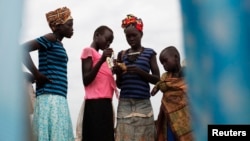The United Nations World Food Program is reducing food aid to nearly 800,000 refugees in Africa.
The agency said the cuts of 40 to 60 percent will affect refugees in the Central African Republic, South Sudan, Chad, Uganda, Mauritania, Mozambique, Ghana, Liberia and Burkina Faso.
The cuts are "threatening to worsen already unacceptable levels of acute malnutrition, stunting and anemia, particularly in children," the WFP and refugee agency UNHCR said in a joint statement.
WFP spokesman Peter Smerdon told VOA in a phone interview Tuesday there are two main reasons for the cut.
"Mostly it is because of funding difficulties. We have not got the money to keep full rations on for these people," Smerdon said.
He said security concerns and the difficulty of shipping food by road also play a role. WFP could transport or drop the food by air, but that makes the operation prohibitively expensive, Smerdon added.
Consequences of malnutrition
However, the long-term consequences of malnutrition are serious, Smerdon stressed.
"If a child from the first thousand days of conception does not receive the correct nutrients and nutrients that it needs to develop, that child will have lifelong consequences on its health," he said.
Smerdon said malnutrition lowers the gross domestic product of many countries by several percentage points.
The cost of the WFP aid programs is far less than the long-term costs associated with malnutrition, he said, adding that finding the money now is difficult.
"There are increasingly a large number of emergencies where people are not receiving enough food and being uprooted from their homes and are in need of food and other assistance just keep themselves alive," Smerdon said. "So those emergencies suck up the money in the short term that would be better spent trying to fix the problem in the longer term."
The U.N. said 2.4 million refugees across Africa depend on its agencies for food.
The WFP said restoring the cuts to its food programs worldwide would require nearly $200 million.




